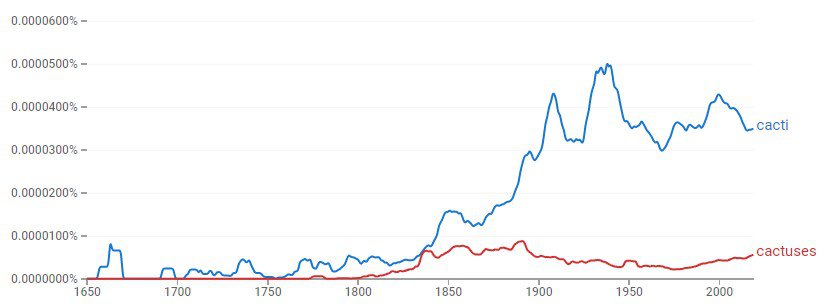Getting stuck on plurals while trying to describe your favorite desert flowering succulent? You aren’t alone when trying to explain which cacti, cactus, or cactuses are your favorite.
Cacti vs cactuses is a common question, and latinate endings can be tricky when determining which words are pluralized by changing “us” to “i” and which words get an “es”.
What is the Plural Form of Cactus? Is it Cactuses or Cacti?
Cacti is the Latin plural of cactus, and for English speakers is a more popular usage. Cactuses is the English plural, and is also completely acceptable to use. Dictionaries list both as a correct form, leaving it up to the user which they prefer.
Latin Nomenclature

The word cactus is a special case in that confusion often reigns over which is correct: cactuses vs. cacti. And the short answer is, both are correct. In fact, like many other names of plants, you can even use cactus as plural if you so choose.
Latin plurals are not considered out of place in botany and other scientific fields, and some make their way into broader usage – but there’s no good reason that the ordinary English speaker should have to abide by the rules of Latin grammar.
Latin has a large influence on the English language, filling in gaps of native words, including abstract nouns, adjectives, and especially synonyms.
But, these influences can also be confusing when Latin grammar rules pertaining to common vocabulary seem to be ignored and take on a life of their own such as when -es is used instead of -i to create a plural. This is normal as words, or forms of words, develop over time and take on new definitions, nuances, or simply are popularly used regardless of what grammar says is right.
Confused yet? Cactus is not the only Latin-derived English word ending in –us, and most are conventionally pluralized in the English manner with an -es instead of the -i the Latin rule says is correct . It’s popular, acceptable, and simply sounds better in most cases.
For example, fungus, like cactus, often becomes fungi (though funguses is just as good), but this is one of the few exceptions. Most English speakers don’t say campi instead of campuses, octopi instead of octopuses, stati instead of statuses, or viri instead of viruses.
There’s no reason cactus should be any different. It’s a matter of preference, though, and cacti is not wrong. In fact, it has been more popularly used than cactuses since the plant was first recognized and classified!
Cacti VS Cactuses Examples
Though cacti has the edge, both forms are common in current news publications and blogs from throughout the English-speaking world—for example:
For days, he trekked through desert plains dotted with cacti as vultures circled above his head. [Newsday]
Text-book cactuses flank the picturesque 449-yard, par-four 14th. [BBC]
Ringed by cacti and red rock buttes and canyons, the town looks like it once was the set of every shoot ’em up cowboy movie. [National Post]
But near the visitor center, which was dug into the earth, irrigated areas coaxed succulent blooms from cactuses. [Minneapolis Star Tribune]
One room has been converted into a type of conservatory, with tiny monkeys swinging from plants, cacti growing out of an old ball-and-claw couch and succulents everywhere. [Mail and Guardian]
All cacti are succulents, but many other plant families include succulent species. [Monterey County Herald]
Wrapping It Up
Bottom line, you can use either the more popular Latin plural cacti, or the English version, cactuses. And you won’t even be wrong if you use cactus in plural form either.
Much of this is due to the changes words undergo through years of use, becoming easier to understand and more acceptable to societal norms.
Yes. language is weird, but at least we have Grammarist to help explain that weirdness to us. If you loved this article, please share!